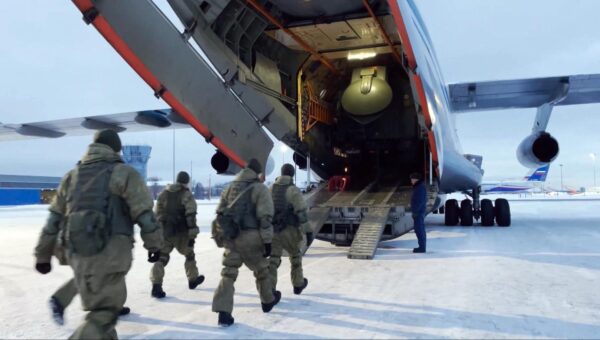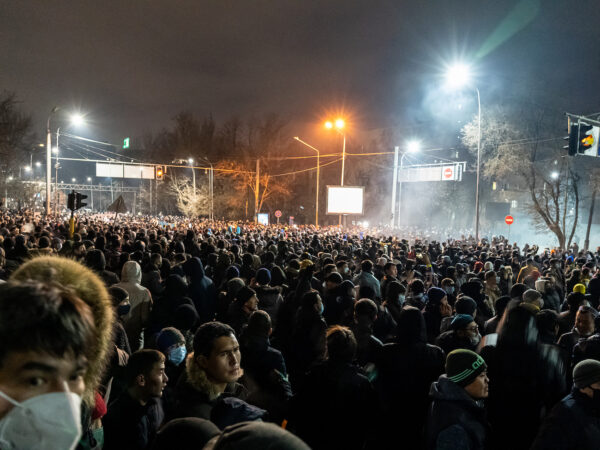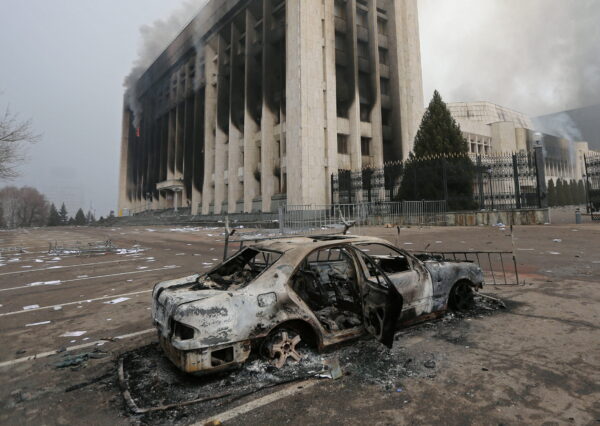Kazakh president Kassym-Jomart Tokayevl has said that at least 20,000 terrorists launched a planned operation against his country as government forces continue to engage in an anti-terrorist operation against what has been termed national and foreign “bandits” with the aid of Russian backed forces.
Tokayev said in an address on national television that he had approved the use of lethal force on the protestors. He also said he had ordered a nationwide communications blackout, Kazakh news agency Tengrinews reported.
“We had to deal with armed and trained bandits, both local and foreign. It is with bandits and terrorists. Therefore, they need to be destroyed. And this will be done shortly,” Tokayev said.
“Almaty alone was attacked by 20,000 bandits.”
The Kazakh president also thanked Russian President Vladimir Putin for “quickly and comradely” responding to his call for help.
He said it was now critically important to understand how the government had “slept through” the underground preparations for terrorist attacks by what he termed militant sleeper cells.
The comments from the President come just hours after the First Deputy Head of the Presidential Administration of Kazakhstan, Dauren Abaev, told Kazakhs on Jan. 7 that the situation in the country’s largest city Almaty was the work of terrorists.
But he assured residents of the city that the government had liquidated and contained many militants and their ties to an extremist organization were being worked out.
“The situation is stabilized. We express our condolences to the families and friends of all the victims. Let’s together return Kazakhstan to normal life,” Abaev said.
According to Abaev, the Russian-backed forces from the Collective Security Treaty Organisation were not participating in any of the Kazakh security operations.

Currently, the number of law enforcement agents killed in the clashes has also grown from 13 to 18, with 748 police officers and National Guard servicemen injured, reports Russian news agency TASS. At the same time, a further 2,298 protestors have also reportedly been detained.
Dozens of protesters were also killed in Kazakhstan as they clashed with security forces, although there was no immediate confirmation on the number of fatalities among protesters.
Social media posts from those in Kazakhstan have revealed that the former capital Almaty is also experiencing heavy gunfire and explosions as protestors clash with CSTO troops and local police forces.
This is what it is like in #Almaty tonight #Kazakhstan pic.twitter.com/L5KfehIrQf
— Abdujalil A (@abdujalil) January 6, 2022
Almaty Police Department chief and city commandant Kanat Taymerdenov noted that the counter-terrorist operation in the city continues, reports Tengrinews.
“Terrorists and their bandit groups offer fierce resistance,” Taymerdenov said. “The anti-terrorist operation continues, … we call on all Almaty residents to exercise caution in the conditions of cleansing out terrorists and bandit formations.”
Tengrisnews has been keeping Kazakhs abreast of the developments in the country through their Telegram channel, one of the few still functioning after the country was plunged into a communications blackout.

The communication blackout in Kazakhstan continued into its second day as peacekeeping troops from the Russian-backed Collective Security Treaty Organisation (CSTO) arrive in the country.
The blackout, which global internet monitor Netblock has called a public safety risk, has been in place for over 36 hours, forcing Kazakhs to rely on messaging platforms like Telegram to communicate amidst the ongoing crisis.
Netblocks noted that the communication outage had a high impact on mobile services, with Kazakhstan’s leading mobile internet services Kcell, Beeline and Tele2 being significantly affected. They also said that almost all internet connectivity in the country was lost from Wednesday night.
⚠️ Update: It’s now Friday morning in #Kazakhstan where internet has been shut down for some 36 hours, placing public safety at risk and leaving friends and family cut off.
Connectivity levels continue to flatline at just 5% of ordinary levels.
📰Report: https://t.co/Op5GwzXKbh pic.twitter.com/xQIYdZVhbK
— NetBlocks (@netblocks) January 6, 2022
The Tokayev government is alleged to be behind the communications blackout, and it is not the first time residents of the Central Asian nation have faced this problem with a similar blackout reported by The Daily Swig, a cybersecurity media agency in 2021 and 2019.
“Last year, internet shutdowns in Kazakhstan coincided with anti-government protests in several cities calling for the release of political prisoners following a resolution passed by the European Parliament on human rights in the country,” Natalia Krapiva, tech-legal counsel at campaign group Access Now, told the Daily Swig. “The authorities responded with violence and detained approximately 50 protesters.”
“In 2019, Kazakhstan throttled and blocked social media when opposition groups called for a protest to coincide with World War II victory celebrations that month, and in 2018, Kazakhstan throttled social media when opposition leaders live-streamed events,” she said.
At present, the Kazakh government has introduced a critical red level terrorist alert for the entire country.
Under the alert, security forces have the power to carry out personal searches and search of vehicles, restrict or prohibit the movement of vehicles and people, freely enter residential and other premises, and control information transmitted through the channels of telecommunication systems.

The protests, which started on Jan. 2 in the west of the country in the city of Zhanaozen and the Mangistau region, began in response to an increase in the price of fuel to 120 tenge (27 cents), from last year’s 60 tenge (14 cents).
However, the protest quickly morphed into discontent at the former president Nursultan Nazarbayev’s continuing presence in the political sphere.
Kazakhs have been taking to social media to show protestors continuing to rally around the nation, with many chanting “Old Man Go” in reference to Nazarbayev.
In other parts of the country, protestors have posted images on Twitter of pulled-down statues of Nazarbayev and clashes with police and military forces.
Nazarbayev stepped down as president in March 2019 after thirty years as the leader but has continued to maintain control over the ruling party Nur Otan until Dec. 2, 2021. His children feature prominently in both Nur Otan and the government.
 RSS Feed
RSS Feed















 January 7th, 2022
January 7th, 2022  Awake Goy
Awake Goy 
 Posted in
Posted in  Tags:
Tags: 













